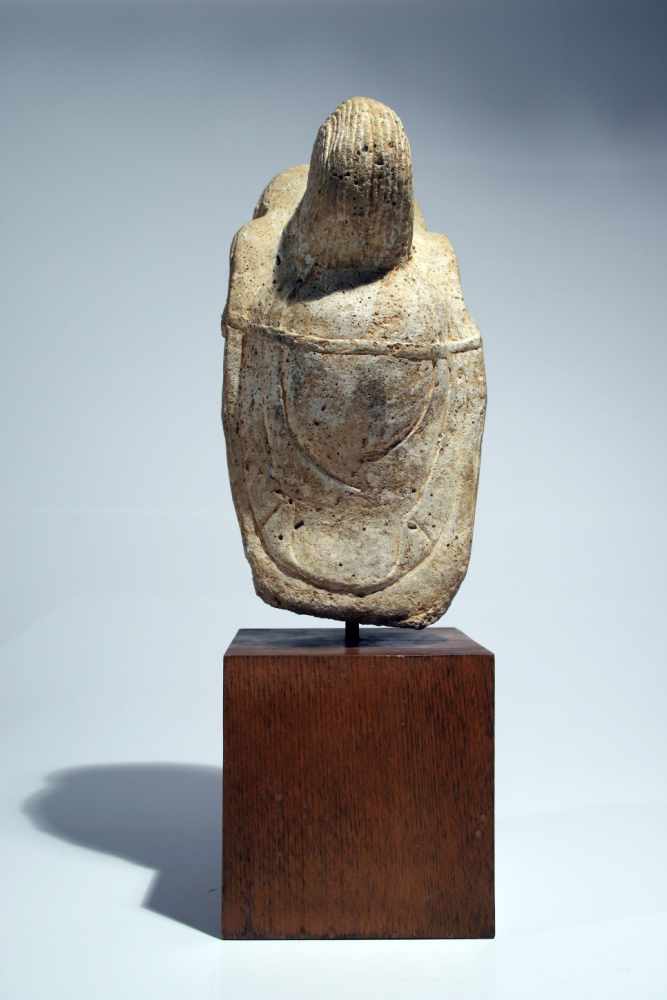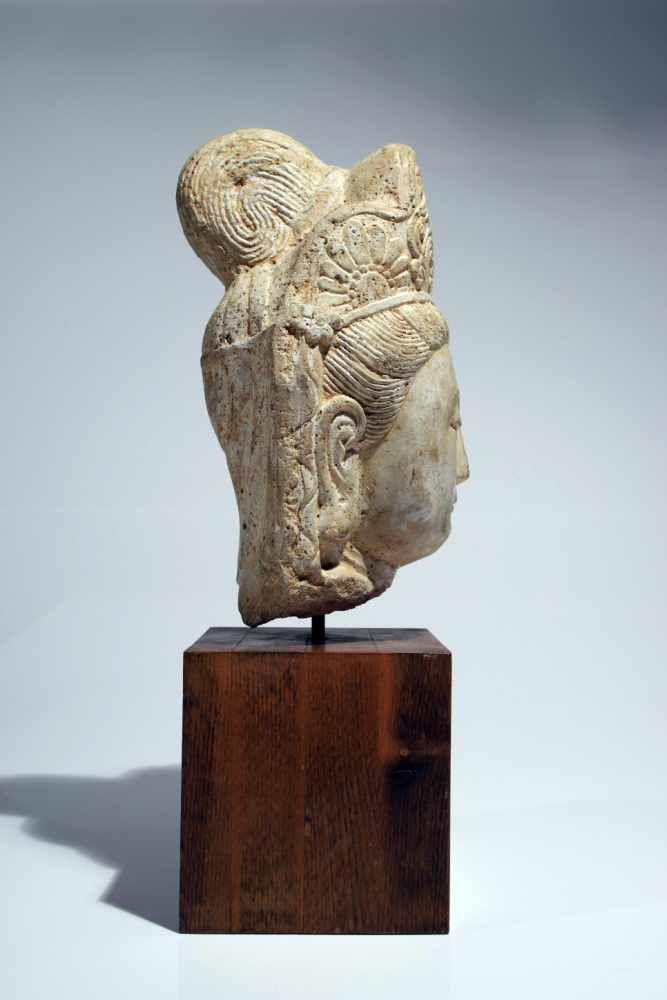52
Head of GuanjinStoneChina12th ctH: 30 cmThis beautifully modeled head of a Guanyin shows the
Stone
China
12th ct
H: 30 cm
This beautifully modeled head of a Guanyin shows the splendor of Buddhist sculpture of the Song Dynasty. With a fleshy, oval face, the eyes are almost closed and a benign smile is playing on the lips. The hair are chiseled with much detail, showing single hairs made up into strands. The Guanyin is wearing a crown with finely worked decorations of wavy forms and flowers. The face is flanked by pendolous earlobes without any jewellery. The head was probably severed from a standing figure and is now attached on a higher wooden base, but still a graceful benevolence emanates from this meditative appearance.
Stone
China
12th ct
H: 30 cm
This beautifully modeled head of a Guanyin shows the splendor of Buddhist sculpture of the Song Dynasty. With a fleshy, oval face, the eyes are almost closed and a benign smile is playing on the lips. The hair are chiseled with much detail, showing single hairs made up into strands. The Guanyin is wearing a crown with finely worked decorations of wavy forms and flowers. The face is flanked by pendolous earlobes without any jewellery. The head was probably severed from a standing figure and is now attached on a higher wooden base, but still a graceful benevolence emanates from this meditative appearance.
Asian Art Auction # 6
Sale Date(s)
Venue Address
General delivery information available from the auctioneer
MAIL BOXES ETC
Alfredstraße 38-40 | 45130 Essen
Tel: +49 201 87 35 610 | www.mbe-essen.de | info@mbe-essen.de
You can get a free shipping quote on our website: https://www.2bhardt.de/shipping
Important Information
Buyer's premium 33 % including VAT
3 % live surcharge plus 19 % VAT
Terms & Conditions
Conditions of auction
1. The auction house acts in the name of and for the account of its client (vendor).
The auction shall be conducted in accordance with the conditions listed below, which are recognised by means of the personal, written, telephone or online participation via the Internet in the auction.
2. The auctioneer retains the right to combine, separate, offer in different sequence or withdraw items from the catalogue.
3. All objects to be auctions may be viewed and inspected prior to the auction. The objects are used. They are purchased in the state in which they are found at the point in time of the purchase. The catalogue information, which is provided according to the best knowledge and in the best conscience, is not contractually bound information regarding quality, or guarantees in the sense of sale of goods law. At the request of the interested party, condition reports provided serve merely as improved orientation regarding the external condition of the object according to the assessment of the auctioneer. The[Office1] auctioneer bears no liability towards the purchaser for faults insofar as they have fulfilled the duty of care to which they are subject. However, they declare themselves willing to make known to the vendor complaints regarding faults that are communicated to him in due time and are well-founded; here, the period of limitation is twelve months from the point in time of the purchase. However, in all cases, a precondition for a reverse transaction is that the auctioned item remains in an unchanged state since the time of auction.
4. Every bidder must give their name and address before the start of the auction. This also applies when they participate in the auction as a representative. In this case, they must also give the name and address of the person they are representing. In cases of doubt, the bidder makes a purchase in their own name and on their own account.
Every bidder must provide a cash deposit before the start of the auction.
5. In order to make sure that the written rules are implemented, they must be entered onto the form provided for the purpose – at least 24 hours before the start of the auction at the auction house. The bidder must provide evidence that they have been received. Precise information regarding the individual or company of the bidder and the lot number must be submitted in order for a written bid to be effective. When a bid is submitted, a telephone number must be given at which the bidder can be regularly contacted. The bid is restricted solely to the given lot number. Written offers will only be considered by the auction house with the amount required in order to out-bid another bid that has been submitted. A precondition for telephone participation is a written notice received at least 24 hours prior to the start of the auction day by the auction house. The auction house bears no liability for the realisation or maintenance of telephone communication connections and the correct transfer and receipt in due time of online offers to the auction house. Of decisive importance for the auction and its progression are the events in the hall (e.g. with regard to revisions in accordance with item 1b). Only those bids submitted in the hall are binding.
The auction house may reject bids if objective reasons are provided. This applies in particular when at the request of the auction house, bidders can provide no sufficient securities prior to the auction which correspond to the value of the bid. If a bid is rejected, the bid submitted immediately prior to it remains binding.
6. The bid is accepted after it has been called to the highest bidder three times. The auctioneer may refuse to accept the bid or accept it on condition; in the latter case, the bidder is bound to their bid for a period of 2 weeks. If several bidders submit the same bid, and no higher bid is offered after the bid is called three times, the matter is decided by lot. The auctioneer may withdraw acceptance of the bid and offer the object again if a higher bid that has been submitted in due time has erroneously been overlooked, or if the highest bidder does not wish their bid to remain valid, or if there is any other doubt regarding acceptance of the bid.
7. The auctioneer may offer the lot for the vendor up to the agreed minimum purchase price (limit) without indicating this, and regardless of whether other bids have been submitted or not. In order to protect the object provided for sale, the auctioneer may accept a bid below the limit to the vendor; this is a case of reversal.
8. Bids may be submitted prior to the auction in written form or by e-mail. They are brought into play by the auctioneer only to the extent required in order to outbid other bids.
9. Deliveries usually are subject to differential taxation in accordance with § 24 of the Turnover Tax Act (UStG), with a premium of 33% being levied on the knockdown total. This premium includes the statutory turnover tax on the total difference. Turnover tax is not shown separately on the invoice. For consignments, e.g. from non-Community countries, which are subject to the import turnover tax (marked by * with the lot no.), the invoicing takes place at the standard tax rate with a premium of 27% levied on the knockdown total. The statutory turnover tax is payable on the knockdown total plus the premium. If, with the application of differential taxation, goods are delivered to another EU country, then the tax exemption for intra-Community deliveries is not applicable. With export deliveries to non-Community countries, the turnover tax is refunded to the purchaser as soon as proof of export and acceptance has been received by the Auctioneer.
Invoices presented during or directly after the auction must be checked; errors are to this extent excepted.
The re-writing of invoices entails additional effort and is therefore subject to a fee.
10. If it should be necessary to obtain a CITES certificate for the purpose of granting special exemptions from the prohibition on marketing items subject to the endangered species convention, then the costs incurred for this purpose shall be borne by the purchaser. There is no guarantee that a permit will be granted (CITES, endangered species, export).
11. The total amount is due on acceptance of the bid, and is payable in cash or through a cheque confirmed by the bank. Payments from successful external bidders who have bid in writing, via e-mail or by telephone, are due within 7 days following the date of invoice.
12. The auction house retains the right to assert claims due to the client which it is representing in their own name – including before a court.
13. Ownership of the purchased items is only transferred to the purchaser following full receipt of payment by the auction house.
14. If payment is delayed, default interest at the level of the standard bank interest rate, although at least at the level of the legal default interest rate in accordance with §§ 288, 247 of the German Civil Code, can be demanded without prejudice to any further damage compensation claims – including legal costs. If due to the delayed payment damage compensation is demanded in lieu of performance, this can be calculated such that the object is re-auctioned in a new auction, and the defaulting purchaser, whose rights from the previous purchase are void and who is prohibited from making a further bid, is liable for a minimum revenue and costs arising through the additional sale, and has no claim to any potential profit.
15. The successful bidder is obliged to take receipt of the objects immediately after the auction. With the transfer, the risk for losses and damage for which there is no responsibility is transferred to the purchaser. The dispatch of purchased items at the request of the purchaser who is the contractor occurs at their own cost and at their own risk. The costs of transport insurance are borne by the purchaser. Following delivery, the purchaser, who is the contractor, must immediately inspect the objects for transport damage and report this to the transport company; later complaints arising from non-covert damage are excluded.
16. On written request, following the conclusion of the auction, the name and address of the respective contractual partner will be made known to the vendor and the purchaser.
17. The place of fulfilment and place of jurisdiction for the commercial transaction is NN. German law applies; the UN Convention on Contracts for the International Sale of Goods (CISG) does not apply.
18. These conditions also apply accordingly for post-auction sale which is a part of the auction; the right of revocation and return for long-distance contracts does not apply.
19. Should one of the above conditions be entirely or partially ineffective, the validity of the others remains intact.
20. Insofar as the conditions of contract are provided in several languages, the German version is decisive.
Versteigerungsbedingungen
1. Das Auktionshaus handelt im Namen und für Rechnung seiner Auftraggeber (Einlieferer).
Die Versteigerung erfolgt zu den nachstehenden Bedingungen, die durch die persönliche, schriftliche, telefonische oder online Teilnahme per Internet an der Versteigerung anerkannt werden.
2. Der Versteigerer behält sich das Recht vor, Nummern des Katalogs zu vereinen, zu trennen, außerhalb der Reihenfolge auszubieten oder zurückzuziehen.
3. Sämtliche zur Versteigerung kommenden Gegenstände können vor der Auktion besichtigt und geprüft werden. Die Sachen sind gebraucht. Sie werden in dem Zustand zugeschlagen, in dem sie sich zum Zeitpunkt des Zuschlags befinden. Die nach bestem Wissen und Gewissen vorgenommenen Katalogangaben sind keine vertraglichen Beschaffenheitsangaben oder Garantien im kaufrechtlichen Sinne. Auf Wunsch des Interessenten abgegebene Zustandsberichte (Condition Reports) dienen nur der näheren Orientierung über den Äußeren Zustand des Objekts nach Einschätzung des Versteigerers. Der Versteigerer übernimmt gegenüber einem Käufer, der Unternehmer ist keine Haftung für Mängel, soweit er die ihm obliegenden Sorgfaltspflichten erfüllt hat. Er erklärt sich jedoch bereit, ihm rechtzeitig vorgetragene, begründete Mängelrügen dem Einlieferer bekannt zu geben; dabei beträgt die Verjährungsfrist zwölf Monate vom Zeitpunkt des Zuschlags an. Eine Rückabwicklung setzt aber jedenfalls voraus, dass der ersteigerte Gegenstand sich in unverändertem Zustand seit der Versteigerung befindet.
4. Jeder Bieter hat vor Beginn der Auktion seinen Namen und seine Anschrift anzugeben. Dies gilt auch, wenn er sich als Vertreter an der Auktion beteiligt. In diesem Fall hat er zusätzlich Namen und Anschrift des Vertretenen anzugeben. Im Zweifel erwirbt der Bieter im eigenen Namen und auf eigene Rechnung.
Jeder Bieter hat vor Beginn der Auktion auf Aufforderung ein Bargeld-Depot zu hinterlegen.
5. Um die Ausführung schriftlicher Gebote sicherzustellen, müssen diese auf dem dafür vorgesehenen Formular - mindestens 24 Stunden vor Beginn der Auktion beim Auktionshaus eingehen. Der Bieter ist für den Zugang beweispflichtig. Zur wirksamen Abgabe eines schriftlichen Gebotes ist die genaue Angabe der Person oder Firma des Bieters sowie der Lot-Nummer erforderlich. Mit der Abgabe des Gebots muss eine Telefonnummer angegeben werden, unter welcher der Bieter regelmäßig zu erreichen ist. Das Gebot beschränkt sich ausschließlich auf die angegebene Lot-Nummer. Schriftliche Gebote werden vom Auktionshaus nur mit dem Betrag in Anspruch genommen, der erforderlich ist, um ein anderes abgegebenes Gebot zu überbieten. Voraussetzung für die telefonische Teilnahme ist eine schriftliche Anzeige, die spätestens 24 Stunden vor Beginn des Auktionstages beim Auktionshaus eingeht. Das Auktionshaus übernimmt keine Haftung für das Zustandekommen oder die Aufrechterhaltung von Telekommunikationsverbindungen sowie die ordnungsgemäße Übermittlung und den rechtzeitigen Zugang von Onlineangeboten an das Auktionshaus. Maßgeblich für die Versteigerung bzw. deren Ablauf ist das Saalgeschehen (z.B. hinsichtlich Berichtigungen gem. Ziffer 1 b). Verbindlich sind lediglich die im Saal abgegebenen Gebote.
Das Auktionshaus kann Gebote bei Vorliegen sachlicher Gründe ablehnen. Dies gilt insbesondere, wenn Bieter auf Verlangen des Auktionshauses keine ausreichenden, dem Wert des Gebots entsprechende Sicherheiten vor der Auktion erbringen können. Bei Ablehnung eines Gebots bleibt das unmittelbar zuvor abgegebene Gebot verbindlich.
6. Der Zuschlag erfolgt nach dreimaligem Ausruf an den Höchstbietenden. Der Versteigerer kann den Zuschlag verweigern oder unter Vorbehalt erteilen; in letzterem Fall bleibt der Bieter 2 Wochen an sein Gebot gebunden. Wenn mehrere Bieter das gleiche Gebot abgeben und nach dreimaligem Ausruf kein höheres Gebot erfolgt, entscheidet das Los. Der Versteigerer kann den Zuschlag zurücknehmen und den Gegenstand erneut ausbieten, wenn irrtümlich ein rechtzeitig abgegebenes höheres Gebot übersehen worden ist oder wenn der Höchstbietende sein Gebot nicht gelten lassen will oder sonst Zweifel über den Zuschlag bestehen.
7. Der Versteigerer darf für den Einlieferer bis zum vereinbarten Mindestverkaufspreis (Limit) auf das Lot bieten, ohne dies anzuzeigen und unabhängig davon, ob andere Gebote abgegeben werden oder nicht. Zum Schutz des eingelieferten Objekts kann der Versteigerer den Zuschlag unterhalb des Limits an den Einlieferer erteilen; in diesem Falle handelt es sich um einen Rückgang.
8. Gebote können vor der Auktion in schriftlicher Form oder per Email abgegeben werden. Sie werden vom Versteigerer nur in dem Umfange ausgeschöpft, der erforderlich ist, um anderweitige Gebote zu überbieten.
9. Die Lieferungen unterliegen im Regelfall der Differenzbesteuerung gem. § 24 UstG: Auf die Zuschlagsumme wird ein Aufgeld in Höhe von 33% erhoben. In diesem Aufgeld ist die gesetzliche Umsatzsteuer (Ust.) auf die Gesamtdifferenz enthalten. Die Umsatzsteuer wird bei der Rechnungsstellung nicht ausgewiesen. Bei Einlieferungen z.B. aus Drittländern, die mit Einfuhrumsatzsteuer belastet sind (Kennzeichnung durch * bei der Lot-Nr.), erfolgt die Fakturierung mit der Regelbesteuerung: Auf die Zuschlagsumme wird ein Aufgeld von 27% erhoben. Auf die Zuschlagsumme zzgl. Aufgeld ist die gesetzliche Umsatzsteuer zu entrichten. Werden bei Anwendung der Differenzbesteuerung Waren in einen anderen EU Mitgliedsstaat geliefert, so ist die Steuerbefreiung für innergemeinschaftliche Lieferungen nicht anwendbar. Bei Ausfuhrlieferungen in Drittländer wird dem Käufer die Umsatzsteuer erstattet, sobald dem Versteigerer der Ausfuhr- und Abnehmernachweis vorliegt.
Während oder unmittelbar nach der Auktion ausgestellte Rechnungen bedürfen der Nachprüfung; Irrtum bleibt insoweit vorbehalten.
Das Umschreiben von Rechnungen ist mit Aufwand verbunden und daher gebührenpflichtig.
10. Besteht die Notwendigkeit zur Einholung von CITES-Bescheinigung zwecks Erteilung von Ausnahmegenehmigungen vom Vermarktungsverbot von Gegenständen, die dem Artenschutzabkommen unterliegen, so gehen hierfür anfallende Kosten zu Lasten des Käufers. Eine Garantie für die Genehmigungserteilung (CITES, Artenschutz, Ausfuhr) wird nicht gegeben.
11. Der Gesamtbetrag ist mit dem Zuschlag fällig und zahlbar in bar oder durch bankbestätigtem Scheck. Zahlungen auswärtiger Ersteigerer, die schriftlich, per Email oder telefonisch geboten haben, sind binnen 7 Tagen nach Rechnungsdatum fällig.
12. Das Auktionshaus ist ermächtigt, die dem von ihm vertretenen Auftraggeber zustehenden Ansprüche im eigenen Namen - auch gerichtlich - geltend zu machen.
13. Das Eigentum an den ersteigerten Sachen erwirbt der Käufer erst mit vollständigem Zahlungseingang beim Auktionshaus.
14. Bei Zahlungsverzug können unbeschadet weitergehender Schadensersatzansprüche - zu denen auch Rechtsverfolgungskosten gehören - Verzugszinsen in Höhe des banküblichen Zinssatzes, mindestens jedoch in Höhe des gesetzlichen Verzugszinses nach§§ 288, 247 BGB verlangt werden. Wird wegen der verspäteten Zahlung Schadensersatz statt der Leistung gefordert, kann dieser auch so berechnet werden, dass der Gegenstand in einer neuen Auktion nochmals versteigert wird und der säumige Käufer, dessen Rechte aus dem vorangegangenen Kauf erlöschen und der zu einem weiteren Gebot nicht zugelassen wird, für einen Mindererlös und durch den zusätzlichen Verkauf entstehende Kosten aufzukommen und auf einen eventuellen Mehrerlös keinen Anspruch hat.
15. Der Ersteigerer ist verpflichtet, die Gegenstände sofort nach der Auktion in Empfang zu nehmen. Mit der Übergabe geht die Gefahr für nicht zu vertretende Verluste und Beschädigungen auf den Käufer über. Die Versendung ersteigerter Sachen auf Wunsch des Käufers, der Unternehmer ist, geschieht auf dessen Kosten und Gefahr. Die Kosten einer Transportversicherung trägt der Käufer. Nach Anlieferung hat der Käufer, der Unternehmer ist, die Sachen unverzüglich auf Transportschäden zu untersuchen und diese dem Transportunternehmen anzuzeigen; spätere Reklamationen wegen nicht verdeckter Schäden sind ausgeschlossen.
16. Auf schriftliche Anfrage werden nach Abschluss der Versteigerung dem Einlieferer und dem Käufer Name und Anschrift des jeweiligen Vertragspartners bekannt gegeben.
17. Erfüllungsort und Gerichtsstand für den kaufmännischen Verkehr ist NN. Es gilt deutsches Recht; das UN-Abkommen über Verträge des internationalen Warenkaufs (CISO) findet keine Anwendung.
18. Diese Bedingungen gelten entsprechend auch für den Nachverkauf, der Teil der Versteigerung ist; das Widerrufs - und Rückgaberecht bei Fernabsatzverträgen findet darauf keine Anwendung.
19. Sollte eine der vorstehenden Bestimmungen ganz oder teilweise unwirksam sein. so bleibt die Gültigkeit der übrigen davon unberührt.
20. Soweit die Auftragsbedingungen in mehreren Sprachen vorliegen, ist die deutsche Fassung maßgebend.
21. Der Auftraggeber erklärt sich mit den hier genannten Bedingungen einverstanden















